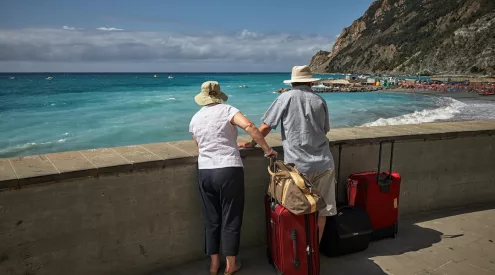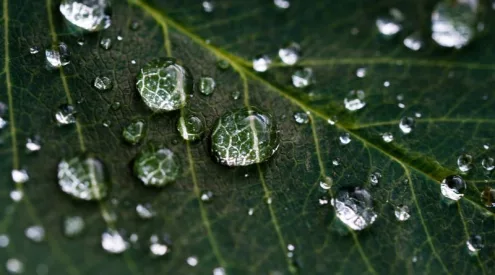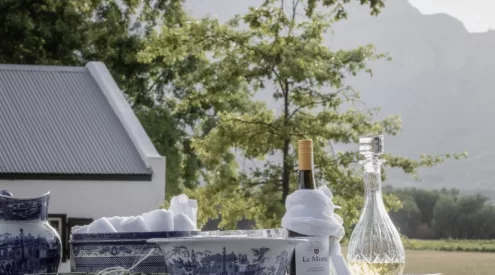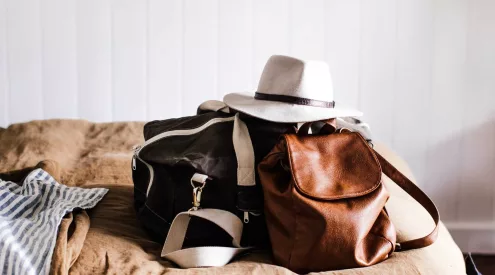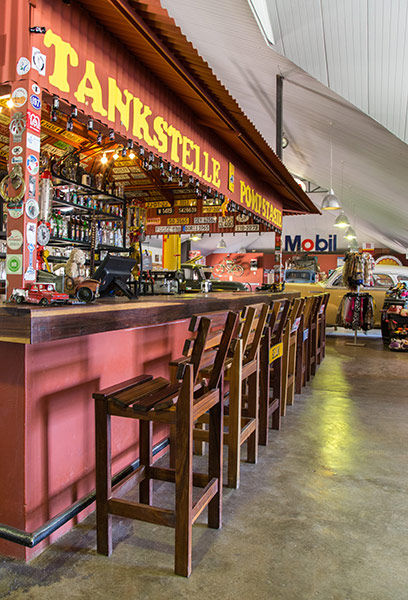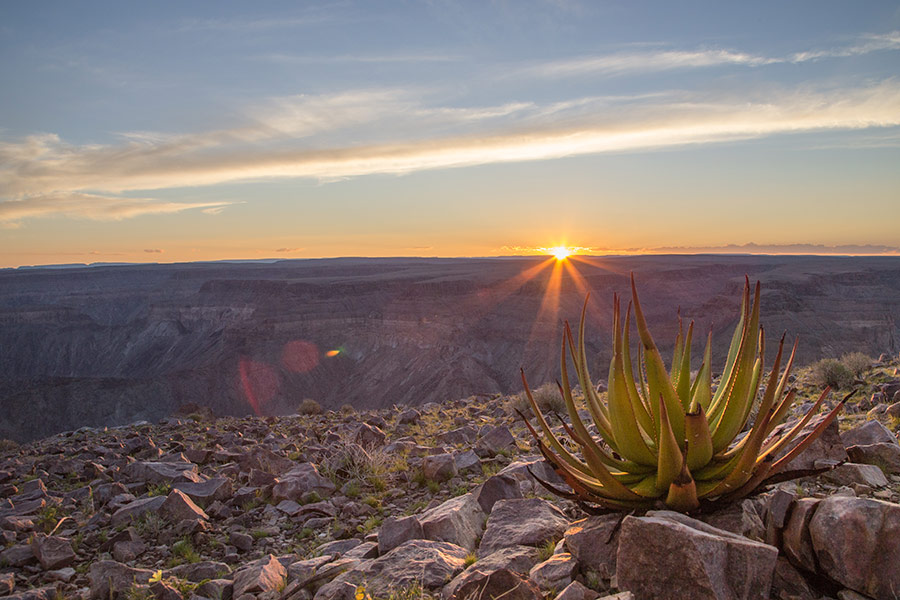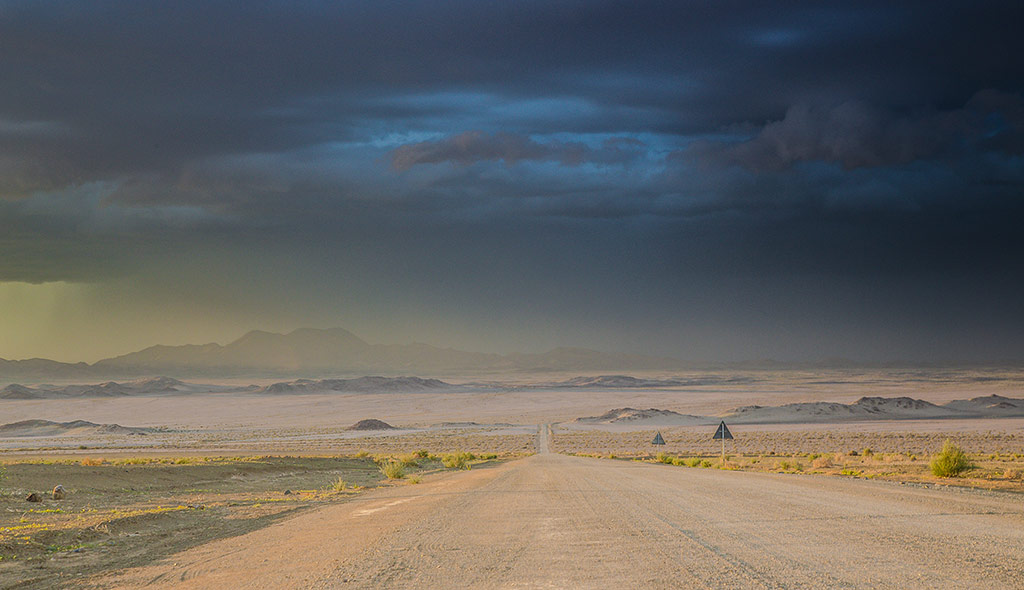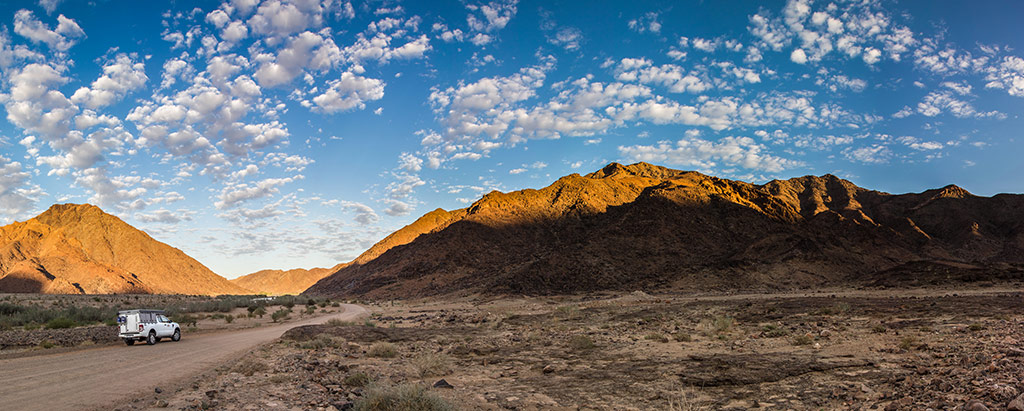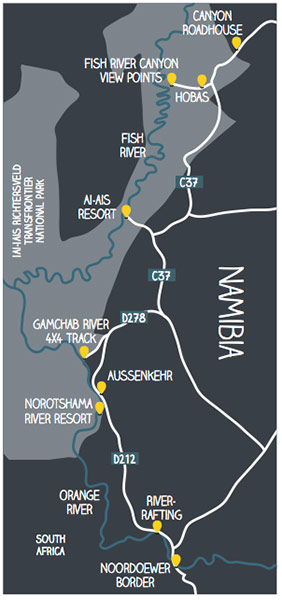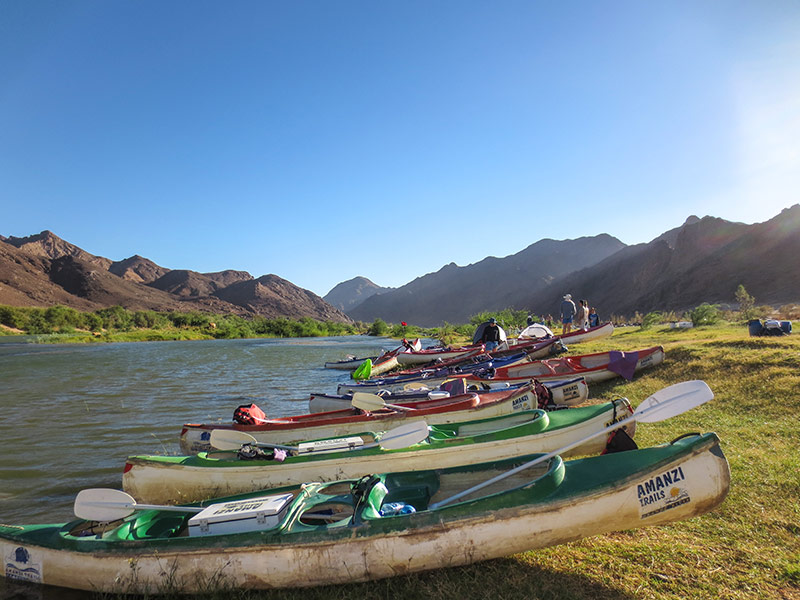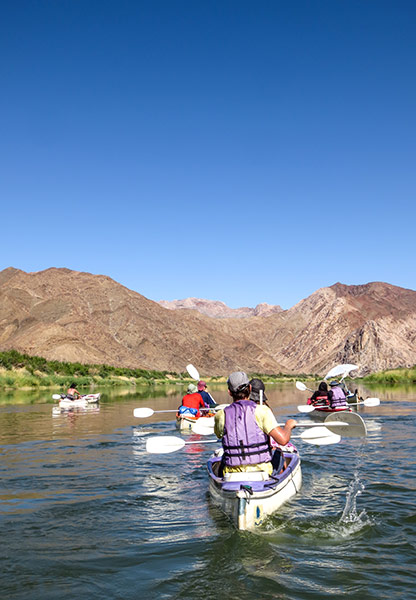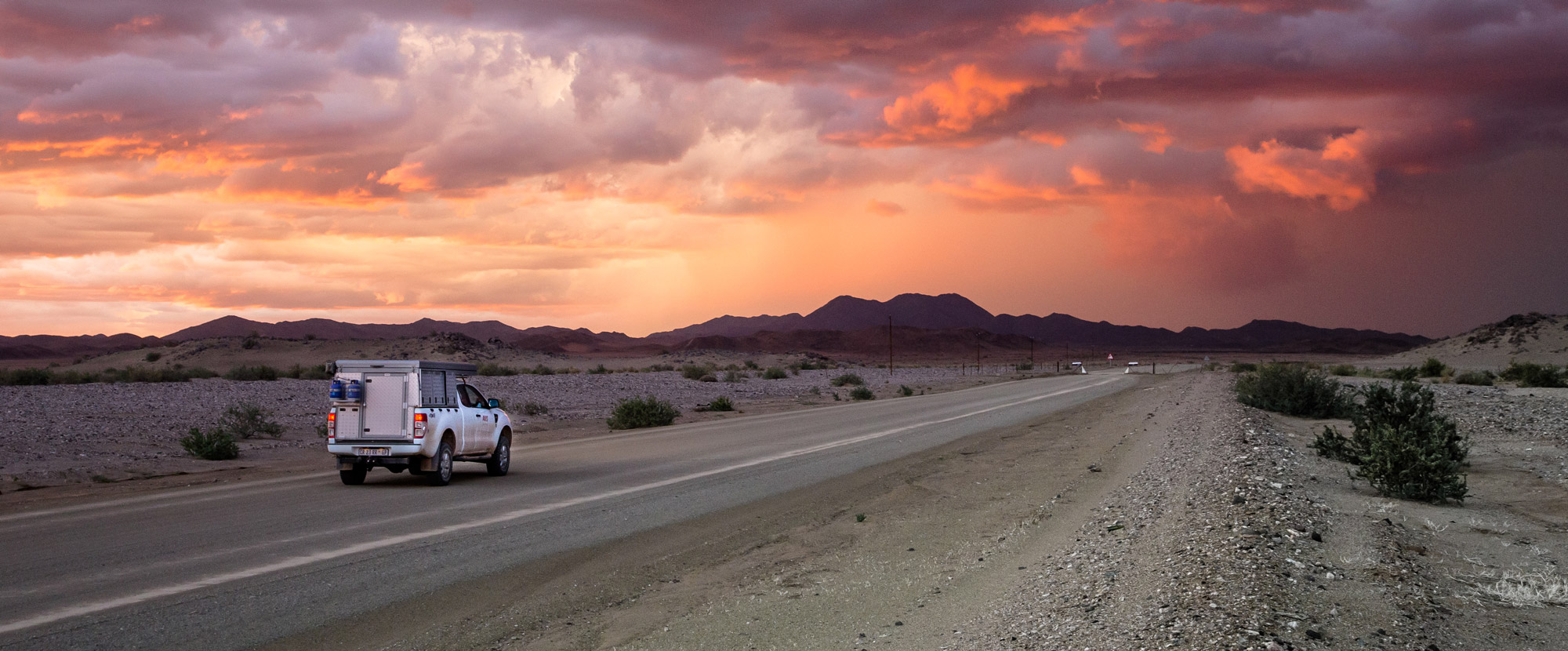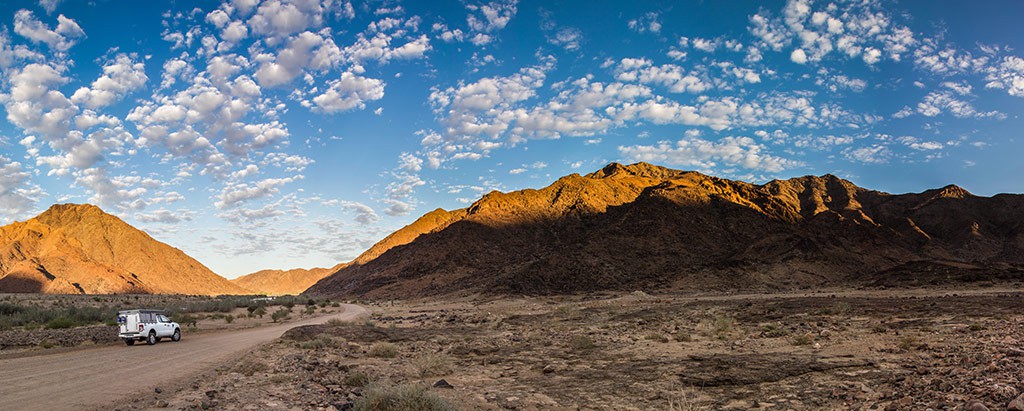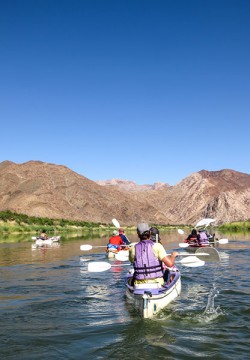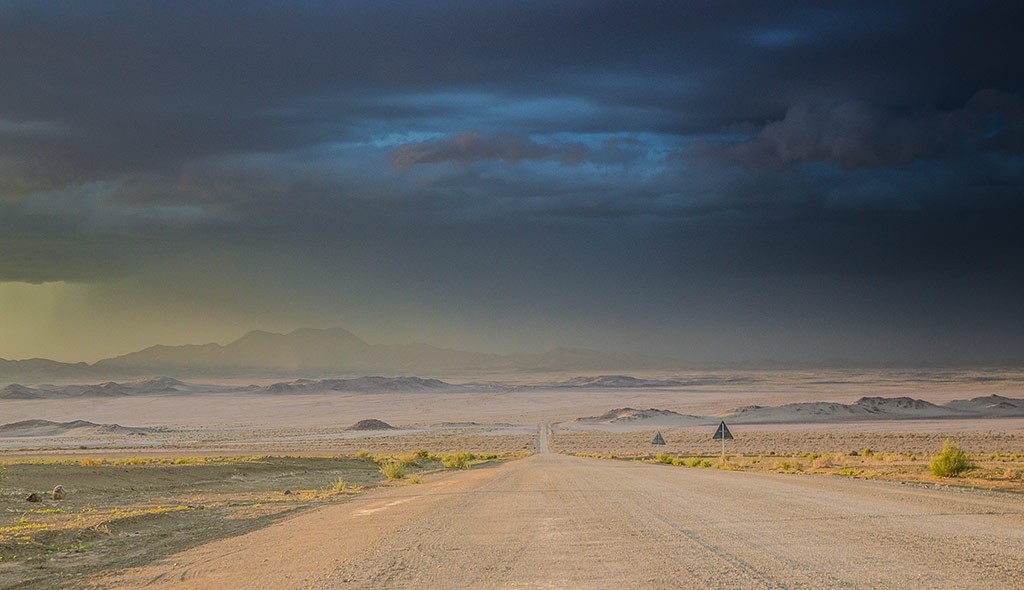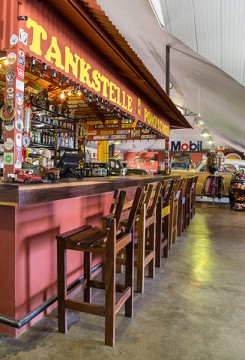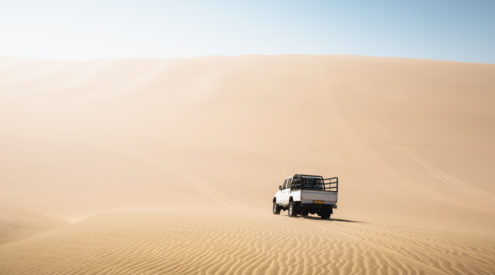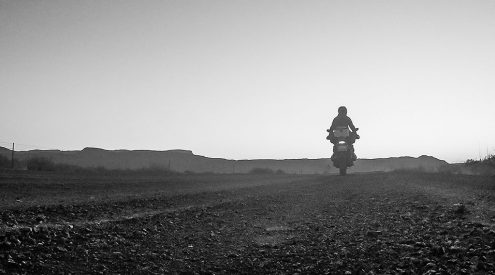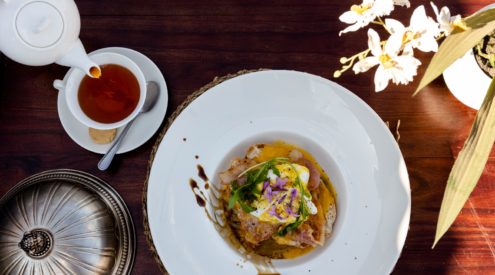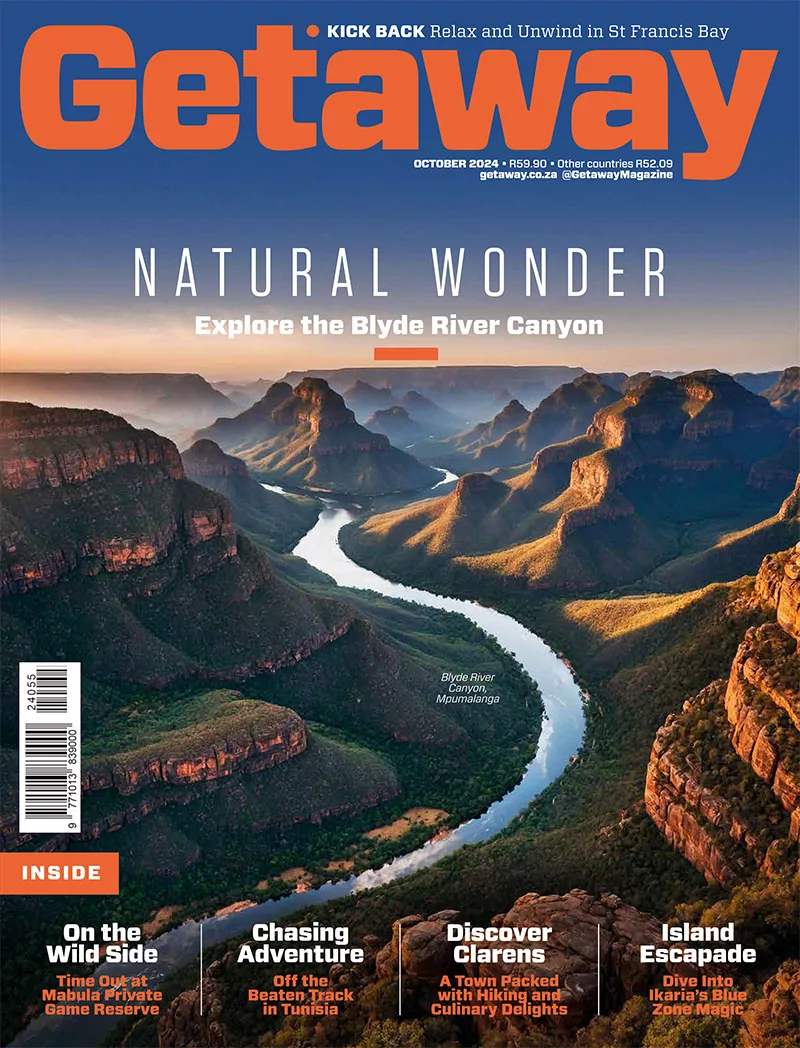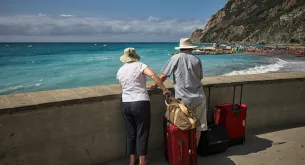Sometimes an oft-travelled route can make you immune to its charms. But it’s a good challenge to stay alert and draw out the pleasures along the way. Here are the things worth stopping for en route to the Fish River Canyon – there are more than you might think.
Also read: where to go, what to do, and how to book parks and accommodation
Namibia travel packages: book all-inclusive travel packages to Namibia

(Please note: All prices for accommodation and activities were correct at time of publication, but are subject to change at the discretion of each operator. Please check with them to confirm current prices before travelling).
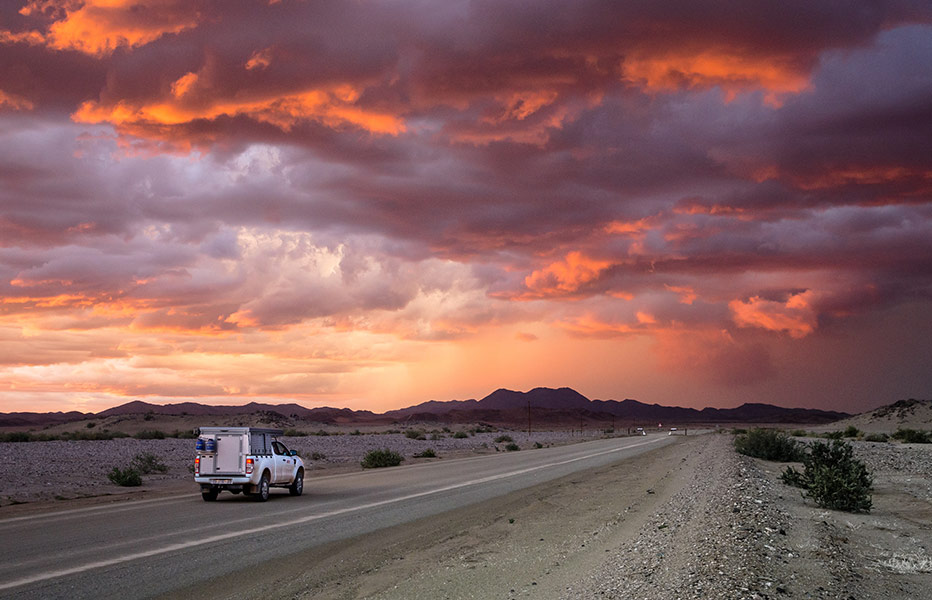
Rainfall is unpredictable and scarce in southern Namibia. It’s not often there’s enough cloud cover for sunsets like these. For the best chance of fiery skies, drive the D278 to Ai-Ais on a late summer’s evening.
The route
For a 160 kilometre-long chasm, the Fish River Canyon is surprisingly inaccessible. It’s not that it’s hard to get to, but if you’re driving to this must-see Southern African wonder, the routes are fairly limited. In part, this is because of the difficult terrain. The |Ai-|Ais/Richtersveld Transfrontier National Park – through which the canyon cuts – is remote, dry and sparsely populated. On top of this, the park is a UNESCO World Heritage Site and is biologically diverse and extremely sensitive. The lack of public roads helps protect the area, but it also means there’s just one trajectory for visiting South Africans.
The road most travelled leaves the Noordoewer Border Post along the D212, heads up the D278 to the hot springs of Ai-Ais, and then bends west along the C37 to Hobas, the neat Namibia Wildlife Resorts campsite at the entrance to the canyon viewpoints. From Noordoewer, you could gun it along the road for three hours and get to the rim in time for sundowners, but this would be a terrible shame. Racing along the Orange River through the lunar-like desert to Ai-Ais means paying scant attention to some of Namibia’s most evocative landscapes. Rather linger along the Orange, drive the Gamchab River 4×4 Trail and cross the D278 at dusk. There are plenty of things to do along the way and slowing the journey is well worth it.
There’s a river to play in
There are very few chilly days in southern Namibia, even in winter. From Noordoewer to the mouth of the Great Fish River, the Orange River meanders through the baking desert and a swim is a great way to cool off. Unfortunately, the D212 doesn’t hug the riverbank the entire way, but excellent swimming spots can be found at one of the well-signposted river-rafting operations en route. If arriving unannounced, Amanzi Trails or Felix Unite are the best options – both welcome day visitors. If you’d like to camp, Amanzi Trails is R80 and Felix Unite is R120 per person per night, or there are chalets from R350 per person.
Unlike Felix, Amanzi rents canoes for the day, which means it’s not necessary to book a river trip to get out for a quick paddle. If it’s not too hot, there’s also a short walk from Amanzi to some ancient San petroglyphs, but wherever you end up, either outfit will be happy to sell you a beer and provide a shady fishing spot – just bring your own gear. There’s no permit required.
Get the adrenaline going
If a swim seems too mundane, a multi-day rafting adventure will ramp things up a notch. This isn’t the white water of the Zambezi (anyone who’s comfortable on a river can tackle these rapids), but there are a few sections that will get the heart racing. Day trips are available at all the camps, but to experience the best of the river – the larger rapids and otherwise inaccessible stretches of Richtersveld paradise – book a longer trip in advance. If Amanzi and Felix are busy, there’s River Rafters next door or Norotshama River Resort, about 50 kilometres downstream, which offers camping for R136 per person and B&B from R494 per person sharing. At Norotshama, you can pick up permits for its Quiver Tree 4×4 Trail (R145) and information on rock-climbing routes that have been established in the surrounding crags.
Time for contemplation
Leaving the cool of the river behind, the D278 heads north to Ai-Ais at Aussenkehr. In the heat of midday, the rocky wilderness is harsh and unwelcoming, but drive it in the early morning or late afternoon and the landscape is softened and transformed. The well-graded dirt road drops gently towards the Gamchab River, where there are breathtaking views in all directions. If you have a 4×4, get close to the western cliffs by skipping the D278 turning and continuing down the D212. About eight kilometres beyond Aussenkehr, the usually dry Gamchab joins the Orange River and for most of the year it’s possible to drive up the tributary along a gravel track that rejoins the D278 12 kilometres further north. As the temperature drops and the light dims to yellows and browns, this is a region that is disrespectful to rush.
Hot things up
A 10-kilometre detour off the main road north, the Ai-Ais Resort is a family favourite. The resort sits inside the canyon walls, so in a sense you’ve already arrived, but the spectacular rim-top views come later. From the bottom of the gorge it’s all about the resort’s thermal baths and cool pools. ‘Ai-Ais’ means ‘burning water’ in the local Nama language and although hot springs may not be an obvious pilgrimage in such a hot climate, the nights can get cold. In any case, there’s a cool outdoor pool for hot summer days. Camping at the resort is from R190 per person, or book a B&B room or family chalet from R479 per person sharing. There’s also a decent restaurant, a bar, fuel if you need it, and day walks along the canyon floor – ask at reception.
Now for the sunset
It’s 80 kilometres from Ai-Ais to the viewpoints at Hobas rest camp. After twisting out of the canyon at Ai-Ais, an hour-long cruise along the C37 deposits you under the trees of this site. While it’s necessary to pass through Hobas to reach the viewpoints, you don’t have to stay at the camp. Day entry permits can be bought at the gate at R60 per person, plus R10 a vehicle. If you do want to stay, camping – at R170 per person a night – is the only option.
Don’t miss the bumpy 4×4 track that heads south along the canyon wall 1,5 kilometres before the edge. It’s not strictly 4×4 but high clearance is recommended and it’s 40 kilometres to the end and back – about a two-hour round trip – with plenty of breathtaking stops. If hiking in the canyon beckons, you’ll have to book the Fish River Canyon Trail that follows the riverbed from Hobas to Ai-Ais. The five- to six-day trail costs R275 per person with a minimum of three people, maximum of 30 per booking. Hiking season runs from 1 May to 15 September and booking is essential. Email [email protected] for information.
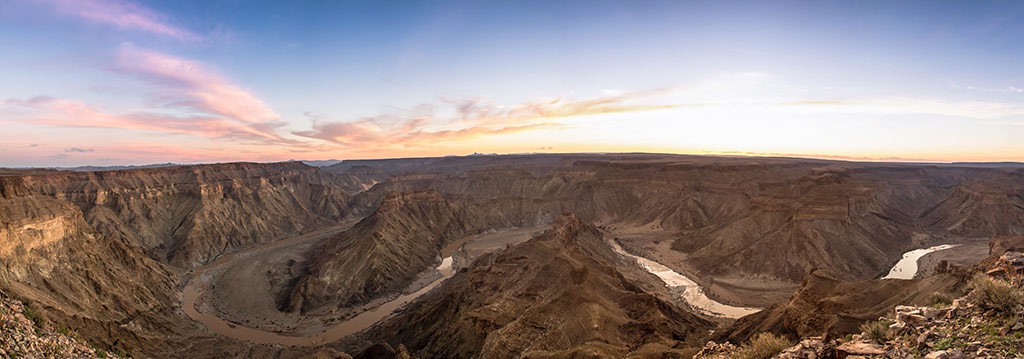
From Hobas, avoid the main canyon viewpoints and drive south along the rim, where there are great, quiet vantage points.
Make it a happy ending
You may have clinked beers over the canyon, but no Fish River road trip is complete without a visit to the Canyon Roadhouse, 16 kilometres north of Hobas. With its classic cars rusting peacefully under quiver trees, this well-known stop has fuel and Wi-Fi, but more importantly good coffee, hot meals and cold beers.
There’s also their 46-kilometre Wildebeest 4×4 Trail for R100 a vehicle plus R50 a person. The trail starts directly across from the roadhouse and does a two-hour loop back south towards Hobas. It’s not technical, but the firm, sandy track passes through some beautiful quiver tree-lined koppies with plenty of picnic spots along the way. Camp at the Canyon Roadhouse from R150 per person or there’s B&B from R920 a person a night.
Activity directory
4×4 Trails
1. Quiver Tree Trail
Contact: Norotshama River Resort, tel +264 63 297 215, norotshamaresort.com
Price: Trail from R145, camping and chalets from R136/R494
2. Wildebeest 4×4 Trail
Contact: Canyon Roadhouse, tel +264 61 23 0066, gondwana-collection.com
Price: Trail from R150, camping and chalets from R150/R920
River rafting
1. Amanzi Trails
Contact: Tel 021 559 1573, amanzitrails.co.za
Price: Camping and chalets from R80/R350
2. Felix Unite
Contact: Tel 087 354 0578 felixunite.com
Price: Camping and chalets from R120/R895
3. River Rafters
Contact: Tel 021 975 9727 riverrafters.co.za
4. Norotshama River Resort
Contact: Tel +264 63 297 215 norotshamaresort.com
Price: Camping and chalets from R136/R494
Rock climbing
1. Aussenkehr rock climbing
Contact: www.aussenkehr.com
Walking
1. Guided canyon walks at Ai-Ais
Contact: Ai-Ais Resort, www.aiaisresort.com
Price: Excursions from R330 per person
Hiking
1. Fish River Canyon hiking trail
Contact: Namibia Wildlife Resorts, tel 021 422 3761, www.nwr.com.na
Price: The multi-day trail costs R330 per person. Camping at Hobas rest camp from R170



